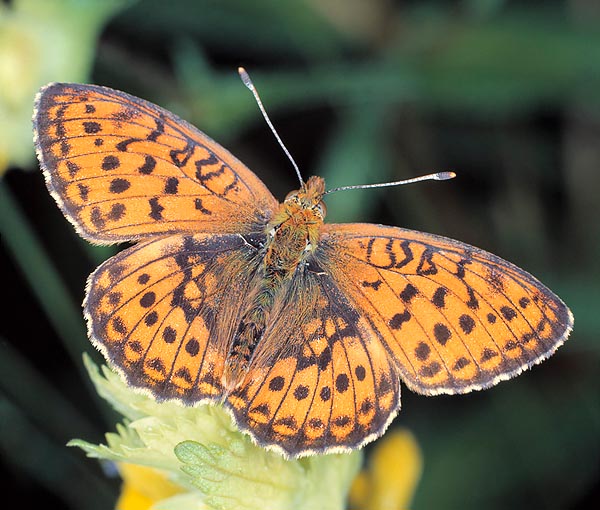Family : Nymphalidae

Text © D. Sc. Giuliano Russini – Biologiste Zoologiste

English translation by Mario Beltramini

The Brenthis ino is a 3-4 cm butterfly loving the wet zones © Giuseppe Mazza
In the Italian language there is not a common name for the Brenthis ino – Rottemburg 1775, called in English Lesser Marbled Fritillary and in French, Nacré de la sanguisorbe or Grande Violette.
It’s a small diurnal butterfly Rhopalocer (Rhopalocera), afferent to the order of Lepidopters (Lepidoptera), to the family of Nymphalids (Nymphalidae) and to the genus Brenthis.
Zoogeography
Palearctic species, diffused in Europe (but the British islands), as well as in temperate Asia up to Japan.
Habitat-Ecology
The humid zones are its typical habitat; for instance, moorland, lands with pastures of blueberries and raspberries.
Morpho-physiology
This small butterfly has the typical black livery on orange background present among the European nymphalids. The lower side of the hind wings is yellow. Several geographic subspecies are known to the entomological biologists, but there are no problems of identification seen its small size and the much marked black edge of the wings. The fore wings have marginal fringes of cream and black colour, whilst in the hind wings we can observe typical ringed brown spots and an indented edge. The wingspan is 3-4 cm. The antennae are clavate. The sexes are similar.
Ethology-Reproductive Biology
The flight of the adult is rather weak and uncertain, it often settles on the soil or on the flowers. The caterpillar is black, with a double white stripe and orange thorns along the back. It develops on the Great Burnet (Sanguisorba officinalis), on the Queen of the meadow (Filipendula ulmaria) and on the Red raspberry (Rubus idaeus).
→ For general notions about the Lepidoptera please click here.
→ To appreciate the biodiversity within the BUTTERFLIES please click here.
